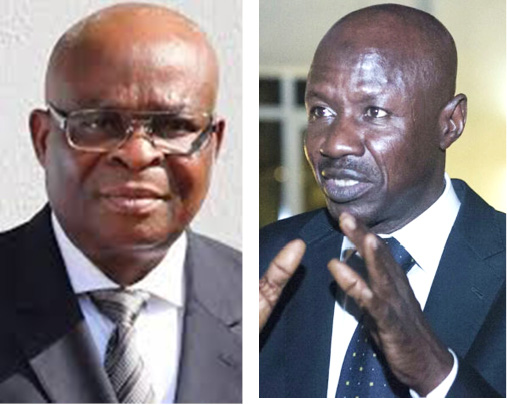Reactions over conflicting verdicts on EFCC’s probe of states
The differing decisions of various high courts on the powers of the Economic and Financial Crimes Commission (EFCC) to investigate the accounts of states have increased the anticipation of Nigerians on the outcome of the various appeals on this vexed issue of law. When in January a Federal High Court in Ekiti ruled that the […]

Reactions over conflicting verdicts on EFCC’s probe of states
The differing decisions of various high courts on the powers of the Economic and Financial Crimes Commission (EFCC) to investigate the accounts of states have increased the anticipation of Nigerians on the outcome of the various appeals on this vexed issue of law.
When in January a Federal High Court in Ekiti ruled that the EFCC has no powers to investigate the finances of the state under the governorship of Ayodele Fayose, the anti-graft agency, through its spokesman, Wilson Uwujaren, vowed to challenge the verdict in a higher court explaining that “the EFCC is confident that the judgement cannot stand.”
Again, on October 4 a High Court in Port Harcourt presided by Justice George Omereji ruled that the EFCC has no right to investigate the Rivers State government or its officials.
However, a Federal High Court in Abuja presided by Justice Nnamdi Dimgba on October 8 ruled that the EFCC has the statutory powers to investigate the officials of Benue State government.
These differing opinions on a similar question of law have thrown the functions and powers of the EFCC into more confusion especially in the eyes of the public.
Under the EFCC Establishment Act, sub-section 1 (a) to (e) of Part II grants it powers to ensure: “(a) the enforcement and the due administration of the provisions of this Act; (b) the investigation of all financial crimes including advance fee fraud, money laundering, counterfeiting, illegal charge transfers, futures market fraud, fraudulent encashment of negotiable instruments, credit card fraud, contract scam, etc.”
Also, “(c) the co-ordination and enforcement of all economic and financial crimes laws and enforcement functions conferred on any other person or authority; (d) the adoption of measures to identify, track; freeze, confiscate or seize proceeds derived from terrorist activities, economic and financial crimes related offences or the properties the value of which corresponds to such proceeds; and e) the adoption of measures to eradicate the commission of economic and financial crimes.”
Reacting to the development, Barr E.M.D Umukoro agreed with Justice Dimgba that the powers of the EFCC to investigate a governor is unfettered based on its Establishment Act, but it lacks powers to freeze the bank accounts of states or to prosecute the governor who enjoys constitutional immunity.
He explained that the basis for the seeming conflicting decisions on the powers of the EFCC to probe into the funds of a state government, could be influenced by the arguments canvassed before the judges by the parties.
He however advised that where they are not satisfied, the parties should go to the Court of Appeal to thrash out the issues.
“A court may decide a matter without the knowledge of a recent superior decision or law etc and thus fall into error,” he said.
“The issue of the powers of investigation of any person (natural or otherwise) by investigating agency has been laid to rest in the case of Fawehinmi vs IGP if my memory recollects correctly,” Umukoro added.
In his submission, Hamid Ajibola Jimoh Esq. said though Section 28 of the EFCC Act as well as Parts 33 and 34 of the Administration of Criminal Justice Act empowers the anti-graft agency to arrest and freeze the accounts of individuals and corporate bodies, same is not referred to a state governor or the accounts of state governments.
He said the sealing of state government account by any executive law enforcement agency without the resolution of the state assembly “is illegal, unconstitutional, null and void and usurpation of the legislative powers, abuse of power, tyrannical and violation of rule of law but respective for rule of force.”
“The constitution has placed all financial investigation on the account or funds of a state government in the State House of Assembly and not the executive or EFCC and even not the governor. So, only the assembly can investigate such account following the laid down procedures for such,” he said.
He also identified the Auditor-General of a state as having the powers to investigate state accounts records, and might be approached by the EFCC if investigation is necessary on state account, “which is a public treasury account.”
In her reaction, the coordinator of the Proactive Gender Initiative, Barrister Esther Uzoma, explained that since the courts that have delivered divergent rulings on the EFCC powers to probe into the finances of states are of coordinate jurisdiction, none is superior to the other or can be bound by the other, adding that the divergence might have arisen from the types of arguments canvassed before the courts.
“In AG Ondo v AG Federation 2002, the Supreme Court stated amongst others that the EFCC Act being a creation of the National Assembly is binding on states, persons and entities,” she said.
Barrister Oghenvo Otemu said though the constitution empowers the state assemblies to legislate on finances of the states, the EFCC has the powers to investigate any one that has committed financial offence the entire country, adding however that the EFCC does not have the powers to freeze the accounts of the state.
While the EFCC has powers to investigate allegations of fraud in public finances, it lacks the powers to freeze accounts of state governments in the course of doing its duty. While the Abuja verdict harped on this point, all eyes would now focus on the appeal by Benue State.
